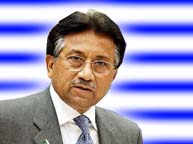US officials urge stability in Pak sans Musharraf
 Washington, Aug 19 : US officials and experts on South Asia have said that the coalition government in Islamabad must now resolve to bring about stability in the country, and that it could be done only if assumed the full burden of fixing the economy and waged a more effective counterterrorism campaign.
Washington, Aug 19 : US officials and experts on South Asia have said that the coalition government in Islamabad must now resolve to bring about stability in the country, and that it could be done only if assumed the full burden of fixing the economy and waged a more effective counterterrorism campaign.
They are of the opinion that it was a testing time for the present day government in Islamabad, since their main “obstacle” Pervez Musharraf had eased himself out of the administration, reported the Washington Post.
Former US deputy secretary of state Richard L. Armitage, said: “We’ll see if they can turn their attention to governance and get a handle on their problems. They have been using the Musharraf thing as an excuse for non-governance.”
Stephen Cohen, a noted South Asia expert, said: “This is really the moment of truth for Pakistan. If this fails, it is unclear what will happen.” Warning that the outside world had to be patient, he said: “It will take the new government a full year to work things out on counterterrorism, a year to make the mistakes they have to make. It is a huge experiment.”
According to the paper, Musharraf’s departure had left a power vacuum in a country beset by spiralling food and energy prices and violence from Islamic radicals. The instability promises to be a major challenge for the next US president, and both candidates weighed in with statements praising today’s developments.
Sentor John McCain, who is Republican presidential candidate, said: “The resignation of President Pervez Musharraf is a step toward moving Pakistan onto a more stable political footing. Pakistan is a critical theatre in countering the threat of al-Qaeda and violent Islamic extremism, and I look forward to the government increasing its future cooperation.”
Xenia Dormandy, a Harvard researcher and former Bush adviser on Pakistan, said she saw little immediate practical change from the departure of Musharraf, especially in the counterterrorism area. “He hasn''t effectively been leading Pakistan for the last six months,” said Dormandy in an interview.
She said the fight against extremists in the tribal regions along the border with Pakistan has been handled on the operational level by the army chief of staff, with policy alternating between military operations and trying to strike political deals with tribal leaders.
“You''re truly not going to see any great changes in Pakistan with Musharraf''s resignation, with the exception you will start to see greater [political] infighting among the coalition partners,” Dormandy added.
Michael J. Green, former top Asia official at the White House who is now at the Center for Strategic and International Studies, predicted that the United States will miss Musharraf. “You could count on him to make tough decisions, even though you could never count on him to completely follow through,” Green said, and added: “It will probably be much harder to get decisive action as we did with Musharraf. The good news is that the democracy process is moving forward, and it may be possible to create a more durable political framework.” (ANI)